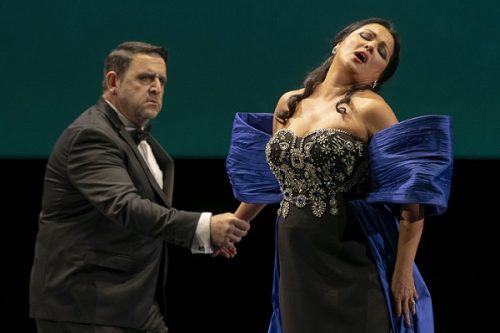 Argentina Verdi, Il trovatore: Soloists, Permanent Chorus and Orchestra of Teatro Colón / Giacomo Sagripanti (conductor). Teatro Colón, Buenos Aires. 15.8.2023. (JSJ)
Argentina Verdi, Il trovatore: Soloists, Permanent Chorus and Orchestra of Teatro Colón / Giacomo Sagripanti (conductor). Teatro Colón, Buenos Aires. 15.8.2023. (JSJ)

Production:
‘Position in space’ – Marina Mora
Sceneric concept – Gabriel Caputo
Lighting design – Rubén Conde
Chorus director – Miguel Martínez
Cast:
Count di Luna – Fabián Veloz
Leonora – Anna Netrebko
Azucena – Olesya Petrova
Manrico – Yusif Eyvazov
Ferrando – Fernando Radó
Inés – María Belen Rivarola
Ruiz – Santiago Martinez
Old Gypsy – Sergio Wamba
Messenger – Cristian Taleb
The Teatro Colón’s new production of Il trovatore presented something of a conundrum – a star cast on the one hand with a semi-staged approach on the other.
While generally regarded among Verdi’s more popular works, and contemporary with Rigoletto and La traviata, its last staging at the Colón was back in 2000 and so high time for a new production. But whether it deserved better than this is a moot point.
In any event, perhaps because of the distance in time but more likely the present cast, the theatre was completely full, despite the worsening economic meltdown following the primary elections of the previous weekend: with economics presumably being the (unstated) reason for the pared down production.
The scenery, such as it was, was made up of bicycle wheel-like structures of varying sizes which were alternated – their intention to expand the visual world of the viewers and enable them to imagine their own time and space, according to the notes in the programme.
The nature of the production was evident from the start with the chorus sat in a semi-circular arrangement at the back of the stage with their scores and in the standard choral attire. Likewise the male members of the cast were suited although the dresses of the women made their appearance visually closer to their respective parts.

The attention was of course focussed principally on Anna Netrebko as Leonora and from her opening aria ‘Tace a la notte placida’ she demonstrated the beauty and power of voice for which she is known and for that and the better known and exquisitely delivered ‘D’amor sull’ali rosee’ Netrebko gained particularly enthusiastic ovations. Her other half Yusif Eyvazov was a robust Manrico and similarly his ‘Di quella pira’ was roundly applauded. His voice, with something of a ‘throaty’ quality and with some unevenness, was nevertheless powerful and expressive.
A prior memory of Fabián Veloz in the role of Count di Luna was from over a decade ago in the early days of his career when he was up and coming and in the intervening years he has solidified his style as a refined and vocally firm Verdian baritone, well suited to these types of roles. Olesya Petrova also was a convincing Azucena, bringing vocal beauty and drama to this key role. Likewise good performances were delivered in the other roles, notably Fernando Radó as Ferrando and María Belen Rivarola as Inés.
Giacomo Sagripanti led the orchestra in a well-balanced performance, with good momentum but never overpowering the singers.
And to round off the evening, there was lengthy and well-deserved applause from an enthusiastic audience.
Jonathan Spencer Jones
